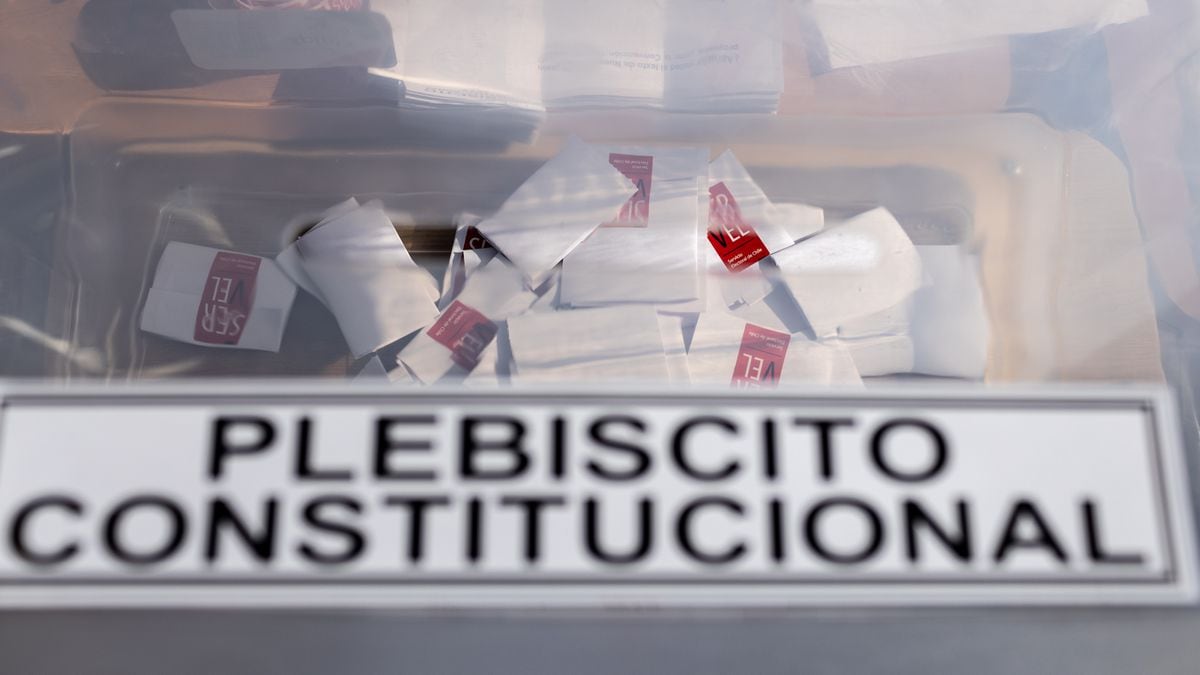Ballots inside one of the ballot boxes in the electoral college installed in the National Stadium in September 2022, Santiago.sofia yanjari
The Executive of Gabriel Boric wanted the two coalitions that make up the government -I Approve Dignity and Democratic Socialism- to be on a single list in the election of the members of the constitutional council, the body that will write the second proposal to replace the Magna Carta inherited from the dictatorship of Augusto Pinochet.
After an intense negotiation, the ruling party has finally registered two lists on Monday.
The Socialist Party has joined the formations of Approve Dignity and the Communist Party, which meant a break with its historical ally, the Party for Democracy (PPD), which decided to agree with the more moderate left-wing formations.
The right will also be divided.
The traditional parties will run together, while the far-right Republican Party will field its candidates alone.
The constitutional council that will be elected on May 7th will be made up of 50 people –25 women and 25 men–.
The body will have five months to draft the proposal that will be put to a referendum on December 17.
Prior to their work, an expert commission of 24 members appointed by the political parties with parliamentary representation will draft a draft.
This is the formula that Congress defined to try to avoid the failures of the previous experience, which ended last September with 62% of the citizenry rejecting the text.
The Socialist Party (PS), together with the formations of Approve Dignity and the Communist Party, presented this morning at the Electoral Service of Chile (Servel) its list baptized "Unity for Chile."
The Socialists advocated an electoral pact for the entire ruling party, but the PPD did not want to go on the same list as Approve Dignity.
In a vote in late January, 94% of the centre-left party's board of directors decided to go on a separate list.
The scenario raised a question about what the socialists would do.
Whether to present himself with his historical partners or split the Democratic Socialism coalition in two to join forces with the rest of the leftist formations that belong to the Government: the Communist Party, the Liberal Party, Social Convergence, Democratic Revolution, Comunes, Humanist Action, Socialist Platform and Social Green Regionalist Federation.
In accordance with what was requested by the Boric Administration, they opted for the latter.
“We are happy to be able to be in a majority to face this fight that is ideological, of ways of seeing society.
Our adversaries are not on the side, they are in front, the adversaries are the ultra-right, demagogy, populism”, the president of the PS, Paulina Vodanovic, assured this morning.
In an interview this weekend with
El Mercurio
, he said: "It seemed to me a duty when it is the President of the Republic who calls for unity, also to listen, because you cannot be partly with the Government and partly outside of it. ”.
This morning the representatives of the “Todo por Chile” list, made up of the PPD, the Radical Party and the Christian Democracy, also arrived at the Servel headquarters.
Aligned with Vodanovic's words, the president of the PPD, Natalia Piergentelli, has said that "the rivals are not on the list of the PS plus I Approve Dignity, the rivals are on the other side, in the People's Party (PDG), in the right".
Regarding the decision to go on a list different from the rest of the ruling party, she has stated: "if we are wrong, we will pay the costs, but going against your convictions is something that can never be paid."
The leader of the Radical Party, Leonardo Cubillos, has indicated that the list they presented intends to "reconstruct a democratic center-left, go looking for that center vote that has been elusive for the government."
The traditional right-wing coalition Chile Vamos - made up of the Independent Democratic Union (UDI), Renovación Nacional (RN) and Evópoli - registered its electoral pact under the name of "Chile Seguro".
From the UDI, the party furthest to the right of the coalition, they called for the Republican Party of José Antonio Kast to join a single pact, but they did not reach any agreement.
Subscribe here to the EL PAÍS America
newsletter
and receive all the latest news from the region
Subscribe to continue reading
Read without limits
Keep reading
I'm already a subscriber

